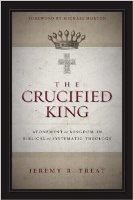A Brief Book Summary from Books At a Glance
About the Author
Jeremy R. Treat (PhD, Wheaton College) is a pastor at Reality LA in Hollywood, California, and an adjunct professor at Biola University in La Mirada, California. Before earning his PhD in systematic theology from Wheaton College, Jeremy was a pastor for seven years in the Seattle area and earned degrees from Seattle Pacific University, Fuller Theological Seminary, and Trinity Evangelical Divinity School.
Introduction
The kingdom of God and the atonement are two of the most significant and most frequently discussed topics in theology. Unfortunately, the relationship that they bear to one another has not as often been considered. The kingdom of God and the atonement are united in God’s purposes and Messiah. They are not merely compatible: they are deeply integrated. The kingdom comes through the cross of Christ, and is itself cruciform. It is through the substitutionary, atoning suffering of the royal seed that the kingdom comes.
In the cross Jesus defeats Satan and the powers of evil (Christus Victor) and also provides penal substitution that satisfies the justice of God so that our sins can be forgiven. Christus Victor and penal substitution are not mutually exclusive theories of the atonement, nor merely compatible perspectives: Christus Victor is founded on penal substitution. Since the kingdom requires the conquering of the king’s enemies, and this conquering requires penal substitution, the kingdom is ultimately established by the substitutionary death of the king.
Table of Contents
Introduction: The Kingdom and the Cross
Chapter 1 Victory through Sacrifice in the Old Testament
Chapter 2 The Suffering Servant and His Kingdom Context in Isaiah
Chapter 3 The Crucified King in Mark
Chapter 4 The Blood of the Cross and the Kingdom of Christ
Chapter 5 Summary: The Kingdom Established by the Cross
Chapter 6 Christ: The King of the Cross
Chapter 7 Atonement: Expansive Particularity
Chapter 8 Atonement: Reconciling Christus Victor and Penal Substitution
Chapter 9 Kingdom: The Cruciform Reign of God
Chapter 10 Conclusion: Crown of Thorns
Chapter 1
Victory through Sacrifice in the Old Testament
In the Scriptures, the kingdom of God and the cross of Jesus Christ are dominant themes. They are also inseparably related within God’s plan of redemption. The OT provides a whole pattern of humiliation, suffering, and exaltation that is prophetic of, and fulfilled in, God’s Son Jesus Christ.
Genesis 1-3 reveals that God is a king who creates and rules by his word. He mediates his rule, however, through the human beings he has made in his image. The language of Genesis 1-2 makes it evident that Eden is a temple, and humanity has been created as priest-kings to extend God’s temple reign throughout the world. In Genesis 3 Adam and Eve fail to obey God and they trespass against their covenant king (cf. Hosea). Even though they have fallen into sin, the first promise of the gospel (the protoevangelium) is recorded in Genesis 3:15. The seed of the woman will destroy the serpent, and through this seed God’s purposes in creation will be brought to pass. The promise is of both suffering (his heel is struck) and victory (he crushes the serpent’s head).
If the protoevangelium is the first hint of future salvation, the promises to Abraham are
[To continue reading this summary, please see below....]The remainder of this article is premium content. Become a member to continue reading.
Already have an account? Sign In
